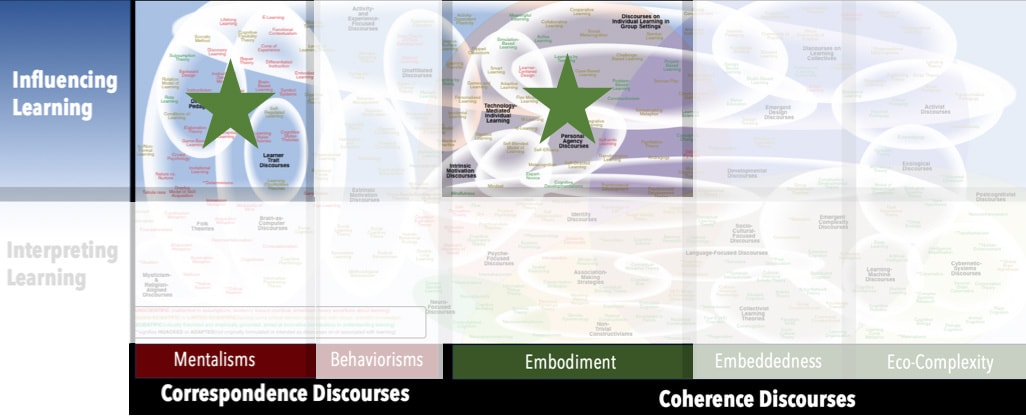AKA
Learning for Mastery
Focus
Individualized pacing to improve achievement and understandingPrincipal Metaphors
- Knowledge is … scope of possible actions and interpretations
- Knowing is … mastery
- Learner is … a refiner (individual)
- Learning is … acquiring, attaining
- Teaching is … instructing
Originated
1960sSynopsis
Mastery Learning is an instructional strategy built on the premise that each student must demonstrate a high level of competence and confidence with prerequisite topics before moving to more advanced topics. With Mastery Learning, responsibility for student failure is laid mainly at the feet of the teacher, and so strategies and pace are adjusted to suit the learner until the required level of mastery is met. Associated constructs and discourses include:- Learning Edge Momentum (Anthony Robins, 2010s) – anchored to the notion that learning happen “at the edges of what we know,” the observation that success in learning fosters success in learning – that is, learning can develop a “momentum” if one routinely experiences success
- Mastery Orientation – an attitude associated with Mastery Learning, typically involving optimism, perseverance, and taking responsibility for one’s own learning
- Mastery-Based Grading – a type of Formative Assessment (see Assessment and Evaluation) typically comprising a description of how well one has mastered a concept along with, if necessary, advice on moving to greater mastery. Variations include:
- Ungrading – a de-emphasis on traditional grading systems in favor of more holistic, student-centered and mastery-oriented assessments. Ungrading challenges the conventional use of grades as motivators and instead focuses on learning, feedback, and self-reflection.
- 2 Sigma Problem (Benjamin Bloom, 1980s) – a critique of conventional models of whole-class teaching based on a study in which students who received 1-on-1 tutoring using mastery techniques performed massively better (i.e., two standard deviations better – see Normal Distribution, under Medical Model of (Dis)Ability) than peers in a control class
Commentary
Mastery Learning was originally articulated in vocabularies associated with Mentalisms, especially the Attainment Metaphor and the Acquisition Metaphor. As it turns out, its grounding principle – that is, that what the learner already knows is the factor most influencing what can be learned – works across virtually all theories of learning. That point suggests that Mastery Learning is more a criticism of traditional teaching practices than an innovative insight.Authors and/or Prominent Influences
Benjamin BloomStatus as a Theory of Learning
Mastery Learning is not a theory of learning. It is, in essence, an application of a principle that is shared by a wide diversity of learning theories – namely that what the learner already knows is the most factor influencing what can be learned.Status as a Theory of Teaching
Mastery Learning is a theory of teaching.Status as a Scientific Theory
Over the past several decades, Mastery Learning has been among the most intensely researched teaching emphases. Results have been consistent across contexts and disciplines: When it is implemented with fidelity, it leads to resounding successes. As with any intensely research phenomenon, some investigations have proven to be flawed. Nonetheless, the breadth and depth of its evidence base places Mastery Learning among the most robust educational theories.Subdiscourses:
- Learning Edge Momentum
- Mastery Orientation
- Mastery-Based Grading
- Programmed Learning
- 2 Sigma Problem
- Ungrading
Map Location

Please cite this article as:
Davis, B., & Francis, K. (2025). “Mastery Learning” in Discourses on Learning in Education. https://learningdiscourses.com.
⇦ Back to Map
⇦ Back to List
